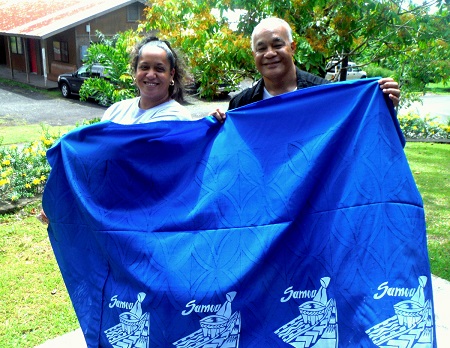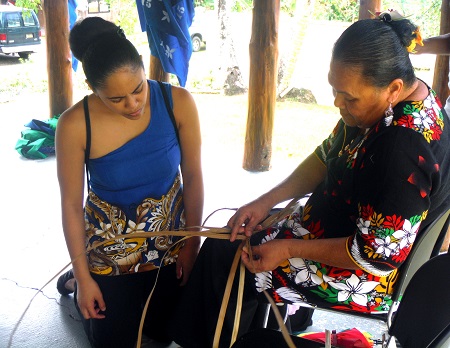
Community Trainer Moresa Langkilde (left) and a participant in the Samoan crafts workshop held by the University Center for Excellence in Developmental Disabilities at ASCC display a newly created piece of elei. (Photo: J. Kneubuhl)

A participant in the Samoan crafts workshop held by the University Center for Excellence in Developmental Disabilities at ASCC observes firsthand the intircacies of traditional weaving. (Photo: J. Kneubuhl)

Community Trainer Moresa Langkilde (left) and a participant in the Samoan crafts workshop held by the University Center for Excellence in Developmental Disabilities at ASCC display a newly created piece of elei. (Photo: J. Kneubuhl)
ASCC-UCEDD Promotes Skills in Traditional Samoan Arts
November 5, 2015
By James Kneubuhl, ASCC Press Officer
In celebration of National Disability Employment Awareness Month, the University Center for Excellence in Developmental Disabilities (UCEDD) at the American Samoa Community College (ASCC) recently collaborated with the Samoan Studies Institute (SSI) to promote traditional Samoan arts for staff and clients of the Office for Vocational Rehabilitation (Voc. Rehab.).
“The purpose of this workshop was to train clients, job coaches and counselors of Voc. Rehab to develop skills in cultural arts as a self-employment opportunity,” said UCEDD Community Trainer Moresa Langkilde. “People with disabilities have one of the highest rates of unemployment in the nation, especially in our Territory, so building upon various cultural art forms which can be offered for sale is an alternative approach to generating income for these clients. Some Voc. Rehab staff also joined in so that they can in turn train their clients on these techniques and methods in the future.”
The two day workshop, held in the falesamoa at the Community & Natural Resources/Land Grant facility, led off with Cultural Artist Patrick Mafoe and Community Outreach Program Coordinator Elisaia Mailo of the SSI leading the participants through the basics of Samoan upeti wood carving and elei making. The latter skill proved most easily adaptable by the participants, who were soon creating their own elei designs on cloth. On the second day of the workshop, participants gained from the insight and experience of mat weavers Si’itia Mase and Maria Feula, themselves trained by a master weaver of Manono. Mase and Felua explained the intricacies of the craft, and gave participants the opportunity for hands-on experience at traditional weaving practices.
Langkilde, who participated in the workshop along with UCEDD Director Tafa Tupuola and staff Nyrese Pato and Lesina Falaniko, described it as a “great success.” The UCEDD Community Trainer explained that individuals with disabilities have a disproportionate level of unemployment, and those who do find jobs often face discrimination in the workplace. “Instead of employers giving them equal opportunities, they give them limited access to skills training because they have low expectations of them,” said Langkilde. “It is important that we speak up and treat them as equals. It is important to not let the disability define them, but rather the content of their character.”
Becoming familiar with Samoan traditional arts not only gives those with disabilities an option for self-employment, but also helps perpetuate the Samoan culture, explained Langkilde. “Learning these skills is an opportunity for self-initiative, creativity and imagination,” said Langkilde, “and also a way of keeping alive our traditions and identity.”
For more information on UCEDD and their services to those with disabilities in our community, visit their web site at: https://www.aucd.org/.
